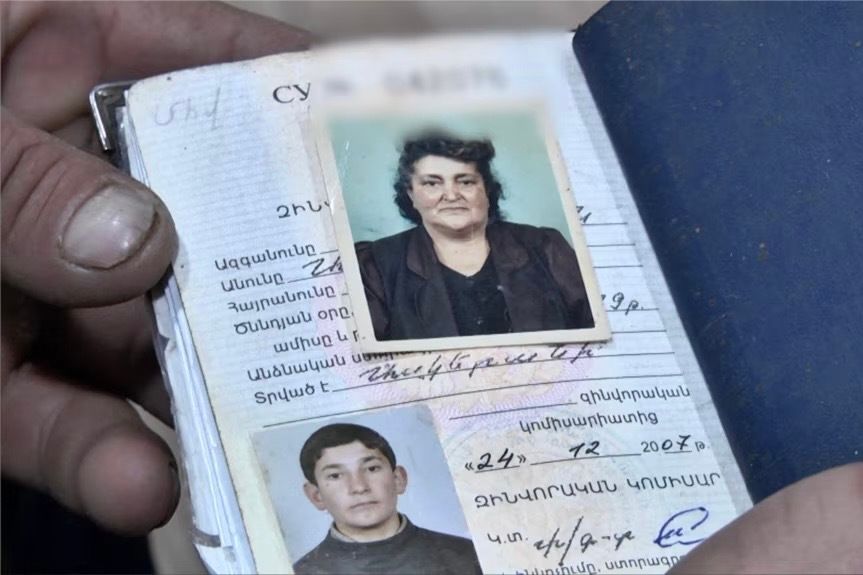
Local media has reported that 58-year-old Karen Avanesyan, an Armenian resident of Stepanakert, Nagorno-Karabakh, has been detained for allegedly planning ‘an armed provocation’. No details were provided about the reasons behind the alleged planned attack.
Azerbaijani pro-government media outlet APA reported the news on Saturday, writing that Avanesyan had hid a Kalashnikov assault rifle, four boxes of ammunition, and five grenades near his house in the forest.
He was reportedly detained by police, during which he resisted arrest ‘with a gun and threw three hand grenades’, wounding one officer. Avanesyan was also wounded as a result of police fire.
No direct claims were made as to where Avanesyan was aiming to pull off his alleged attack, however pro-government media outlets noted that Azerbaijani President Ilham Aliyev visited Stepanakert on the same day Avanesyan was arrested, prompting some on social media to speculate, without providing evidence, that Avanesyan intended to assassinate Aliyev.
On Sunday, APA published footage claiming to show Avanesyan ‘preparing for an armed provocation’.
In the footage, Avanesyan goes back and forth from his alleged place of residence to an unknown location several times with backpacks. He is also shown wearing different sets of clothing.
On Monday, Aliyev met with Khojali residents, where he spoke about Nagorno-Karabakh Armenians, stating that he offered the Nagorno-Karabakh authority to ‘follow the laws of Azerbaijan […], accept Azerbaijani citizenship, and live here, no one will say a word to you’.
‘And again, military provocations, political ones, arrogance and, in fact, a negative attitude towards us appeared. Therefore, the anti-terrorist operation of 19–20 September [2023] became a lesson for them and for everyone’, Aliyev added.
OC Media has reached out to the spokesperson of Stepanakert’s Restoration, Construction and Management Service, but did not receive a response.
Armenian reactions
There have been sceptical reactions to the incident in Armenia, with some insisting that the whole scene was staged, pointing out the excessive presence of surveillance cameras in largely abandoned Stepanakert.
Others suggested that Avanesyan has a mental illness.
On Monday, Tigran Abrahamyan, an MP from the opposition I Have Honour faction, noted in a Facebook post that it was ‘difficult to say what actually happened’. He said that while there were around 50 Armenians who stayed in the region after Azerbaijan’s final offensive in 2023, only around 10 remain as of 2025.
Those who remain are reportedly mostly the elderly or people with disabilities.
Abrahamyan did not rule out that it could have been a response to the ‘videos expressing mockery and insults towards Armenians in Stepanakert’, which he said ‘often’ emerges on Azerbaijani social media.
‘This also suggests what would have happened to the people of Artsakh [Nagorno-Karabakh] if they had listened to the exhortations of the Armenian authorities to stay and live in Artsakh, in an environment of Azerbaijani control and hatred,’ Abrahamyan said.
The comment was an apparent reference to the claims of Armenian Prime Minister Nikol Pashinyan, who stated on 21 September 2023 following the Azerbaijani assault of Nagorno-Karabakh that there was no ‘direct threat’ from Azerbaijan to Nagorno-Karabakh Armenians. Pashinyan urged them to stay in their homes, directly contradicting warnings from international organisations, the government in Stepanakert, and his own foreign minister, that there was a looming threat of ‘ethnic cleansing’ and ‘genocide’.

There is limited information available about the conditions of those who remain due to the lack of international media or organisations reporting on the ground.
Most recently, in March, two ethnic Armenians testified during a trial of the region’s former State Minister Ruben Vardanyan, reportedly accusing him of sponsoring the planting of mines in Nagorno-Karabakh, recruiting mercenaries, and establishing military warehouses.
The two Armenians previously appeared in Azerbaijani propaganda videos.
Nagorno-Karabakh’s former State Minister Artak Beglaryan suggested that at least one of them ‘is an alcoholic’ and that Nagorno-Karabakh Armenians ‘know’ that they ‘also have mental stability issues’.
Following the exodus, some of the Armenians moved to Armenia with the help of the Red Cross. One of them, Sargis Galstyan, a former Nagorno-Karabakh official, was detained by Yerevan on espionage charges following his move to Armenia months after the region’s surrender.
In April, a controversy arose around the body of a Nagorno-Karabakh Armenian body that was transferred to Armenia.

For ease of reading, we choose not to use qualifiers such as ‘de facto’, ‘unrecognised’, or ‘partially recognised’ when discussing institutions or political positions within Abkhazia, Nagorno-Karabakh, and South Ossetia. This does not imply a position on their status.










